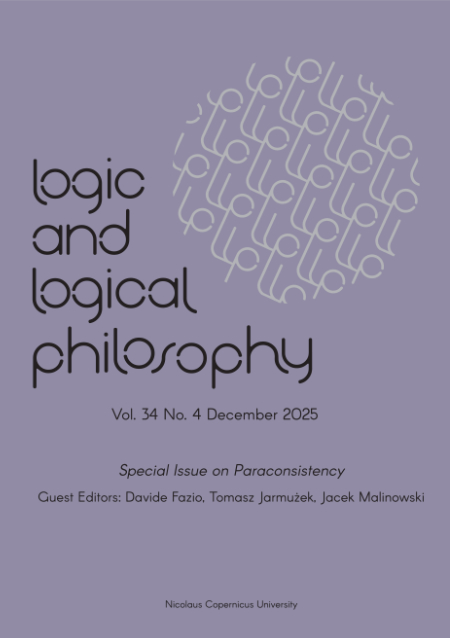Paradoxes versus Contradictions in Logic of Sentential Operators
DOI:
https://doi.org/10.12775/LLP.2024.002Keywords
sentential operators, semantic and intensional paradoxes, classical logic, paraconsistent semantics, (semi)kernels of digraphsAbstract
Classical logic, of first or higher order, is extended with sentential operators and quantifiers, interpreted substitutionally over unrestricted substitution class. Operators mark a single layered, consistent metalanguage. Self-reference, arising from substitutional quantification over sentences, allows to express paradoxes which, unlike contradictions, do not lead to explosion. Semantics of the resulting language, using semi-kernels of digraphs, is non-explosive yet two-valued and has classical semantics as a special case for clasically consistent theories. A complete reasoning is obtained by extending LK with two rules for sentential quantifiers. Adding (cut) yields a complete system for the explosive semantics.
References
Azzouni, J., 2003, ‘The strengthened liar, the expressive strength of natural languages, and regimentation’, The Philosophical Forum 34 (3–4): 329–350. DOI: http://dx.doi.org/10.1111/1467-9191.00142
Båve, A., 2012, “On using inconsistent expressions”, Erkenntins 77 (1): 133–148. DOI: http://dx.doi.org/10.1007/s10670-011-9310-2
Beringer, T., and T. Schindler, 2017, “A graph-theoretic analysis of the semantic paradoxes”, The Bulletin of Symbolic Logic 23 (4): 442–492. DOI: http://dx.doi.org/10.1017/bsl.2017.37
Chihara, C., 1974, “The semantic paradoxes: a diagnostic investigation”, The Philosophical Review 88 (4): 590–618. DOI: http://dx.doi.org/10.2307/2184846
Cobreros, P., P. Égré, D. Ripley, and R. van Rooij, 2013, “Reaching transparent truth”, Mind 122 (488): 841–866. DOI: http://dx.doi.org/10.1093/mind/fzt110
Deutsch, H., 2010, “Diagnoalization and truth functional operators”, Analysis 70 (2): 215–217.
Dung, P. M., 1995, “On the acceptability of arguments and its fundamental role in nonmonotonic reasoning, logic programming and n-person games”, Artificial Intelligence 77 (2): 321–357. DOI: http://dx.doi.org/10.1016/0004-3702(94)00041-X
Eklund, M., 2002, “Inconsistent languages”, Philosophy and Phenomenological Research 64 (2): 251–275. DOI: http://dx.doi.org/10.1111/j.1933-1592.2002.tb00001.x
Grim, P., 1993, “Operators in the paradox of the knower”, Synthese 44 (3): 409–428. DOI: http://dx.doi.org/10.1007/BF01064487
Halbach, V., 1999, “Disquotationalism and infinite conjunctions”, Mind 108: 1–22. DOI: http://dx.doi.org/10.1093/mind/108.429.1
Halbach, V., 2009, “On the benfits of a reduction of modal predicates to modal operators”, pages 323–333 in A. Hieke and H. Leitgeb (eds.), Reduction, Abstraction, Analysis, Ontos Verlag.
Horsten, L., and H. Leigeb, 2001, “No future”, Journal of Philosophical Logic 30 (3): 259–265. DOI: http://dx.doi.org/10.1023/A:1017569601150
Ketland, J., 2005, “Yablo’s paradox and ω-inconsistency”, Synthese 145 (3): 295–302.
Montague, R., 1963, “Syntactical treatment of modality, with corollaries on reflection principles and finite axiomatizability”, Acta Philosophica Fennica 16: 153–167.
Neumann-Lara, V., 1971, “Seminúcleos de una digráfica”, Technical report, Anales del Instituto de Matemáticas II, Universidad Nacional Autónoma México.
Patterson, D., 2009, “Inconsistency theory of semantic paradox”, Philosophy and Phenomenological Research 79 (2): 387–422. DOI: http://dx.doi.org/10.1111/j.1933-1592.2009.00283.x
Perlis, D., 1988, “Languages with self-reference II: knowledge, belief, and modality”, Arificial Intellgence 34 (2): 179–212. DOI: http://dx.doi.org/10.1016/0004-3702(88)90038-0
Picollo, L., and T. Schindler, 2018, “Disquotation and infinite conjunctions”, Erkenntins 83 (5): 899–928. DOI: http://dx.doi.org/10.1007/s10670-017-9919-x
Prior, A. N., 1961, “On a family of paradoxes”, Notre Dame Journal of Formal Logic 2 (1): 16–32. DOI: http://dx.doi.org/10.1305/ndjfl/1093956750
Quine, W. V. O., 1970, Philosophy of logic. Harvard University Press, Cambridge.
Rabern, L., B. Rabern, and M. Macauley, 2013, “Dangerous reference graphs and semantic paradoxes”, Journal of Philosophical Logic 42 (5): 727–765. DOI: http://dx.doi.org/10.1007/s10992-012-9246-2
Rahman, S., T. Tulenheimo, and E. Genot (eds.), 2008, Unity, Truth and the Liar, Springer. DOI: http://dx.doi.org/10.1007/978-1-4020-8468-3
Read, S., 2002, “The liar paradox from John Buridan back to Thomas Bradwardine”, Vivarium 40 (2): 189–218. DOI: http://dx.doi.org/10.1163/156853402320901812
Reinhardt, W. N., 1980, “Necessity predicates and operators”, Journal of Philosophical Logic 9 (4): 437–450. DOI: http://dx.doi.org/10.1007/BF00262865
Ripley, D., 2012, “Conservatively extending classical logic with transparent truth”, The Review of Symbolic Logic 5 (2): 354–378. DOI: http://dx.doi.org/10.1017/S1755020312000056
Ripley, D., 2013, “Paradoxes and failures of cut”, Australasian Journal of Philosophy 91 (1): 139–164. DOI: http://dx.doi.org/10.1080/00048402.2011.630010
von Neumann, J., and O. Morgenstern, 1944, Theory of Games and Economic Behavior, Princeton University Press.
Downloads
Published
How to Cite
Issue
Section
License
Copyright (c) 2024 Michał Walicki

This work is licensed under a Creative Commons Attribution-NoDerivatives 4.0 International License.
Stats
Number of views and downloads: 2341
Number of citations: 0







